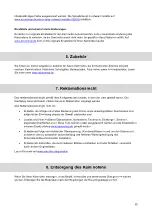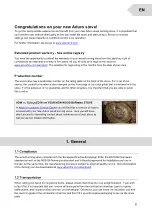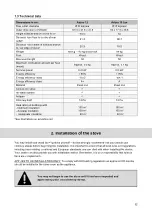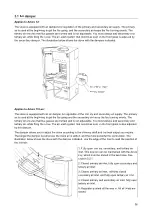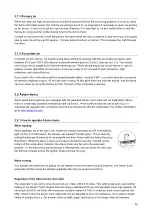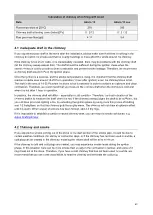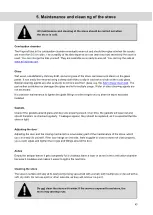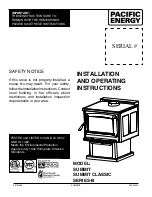
41
3.5 Lighting a fire in the wood burning stove
The fire lighting method is very important for starting combustion quickly and efficiently.
1. Pull out the damper/dampers (depending on the stove) to open primary, secondary, and tertiary air
supply.
2. Place a log of wood crosswise in the combustion chamber and put 2 firelighters close to the log.
Light the firelighters and quickly put a new log close to the firelighters and several small logs at an
a
ngle above it. Air must be able to reach the firelighters, but the logs should be touching to “warm”
each other.
3. When there are distinct, visible flames and the fire is burning well, close the primary air (see section
3.1)
3.6 Recommended fuels
We recommend the use of split hardwood that has been stored outdoors under cover for at least 1 year.
Wood that has been stored indoors has a tendency to become too dry and will burn too quickly. We
recommend that you fell the wood during the winter when a lot of the moisture in the wood will have been
drawn down into the roots. In order to achieve optimum combu
stion, the wood’s moisture level should not
exceed 18%, which roughly corresponds to storing the wood outdoors under a cover for one year. The
moisture level of the wood can be measured using a wood moisture meter or by applying dishwashing liquid
to one end of the log and blowing air in the other end. If the wood is dry enough, soap bubbles will appear.
The wood should be chopped into logs with a diameter of approx. 10 cm and a length of max. 34 cm (Aduro
12) / max. 50 cm (Aduro 15 Lux). Firing with wet fuel will reduce the energy efficiency and increase the
particle emission.
Burning varnished wood, impregnated wood, chipboard, paper, and other waste is strictly forbidden. Burning
these materials will damage the environment, the wood burning stove, and your own health. Fossil fuels
must not be used.
4. The chimney
The stove is tested in accordance with current standards, where a smoke exhauster secures a constant
chimney draft of 10-14 Pascal (Pa). However, with a natural draft (without a smoke exhauster installed) the
chimney draft will increase to 18-25 Pa at optimum conditions. There are many factors that affect the
chimney draft, including the outside temperature, wind strength, and surrounding buildings. There are no
requirements with respect to specific chimney heights, but a chimney must be tall enough to provide a good
draft. If the recommended chimney draft is not achieved, there may occur problems with smoke coming out
of the door during firing.
The control handles will get warm when the wood burning stove is in use.
Please use the glove provided when you operate the wood burning stove.




